Seeds
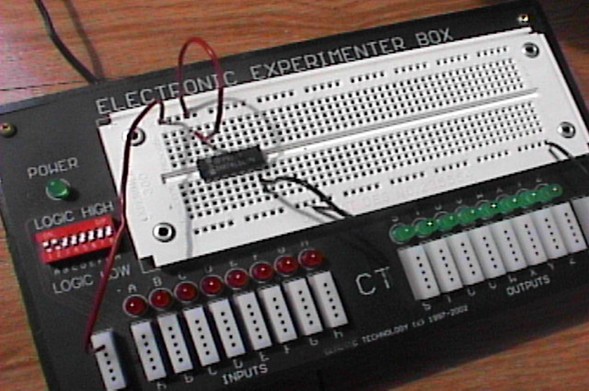 The year is 2003. RSGC's standard university preparatory curricula is well-established for all students and a wide variety of Advanced Placement courses are offering highly-motivated Georgians the opportunity to process first-year university concepts. Business courses are popular and a large number of commerce-hopeful students are confident, but unaware, of the impending financial collapse about to unfold in their undergraduate years. Mathematics, science, and software courses are healthy and a handful of RSGC graduates are enrolling in engineering programs with aspirations for success, despite having little first-hand experience in the discipline.
The year is 2003. RSGC's standard university preparatory curricula is well-established for all students and a wide variety of Advanced Placement courses are offering highly-motivated Georgians the opportunity to process first-year university concepts. Business courses are popular and a large number of commerce-hopeful students are confident, but unaware, of the impending financial collapse about to unfold in their undergraduate years. Mathematics, science, and software courses are healthy and a handful of RSGC graduates are enrolling in engineering programs with aspirations for success, despite having little first-hand experience in the discipline.
Still, one had the distinct sense that something is missing, both in our course offerings and the Ontario Ministry of Education's.
Hands-on technical courses and related careers are largely considered by academia as the primary, if not exclusive, responsibility of colleges and workplaces, so RSGC has not seen the need to offer them while implementing a Mission Statement that declares it to be a university-preparatory institution. Jeff Bezos had started Amazon almost a decade earlier in 1994, Google, 5 years ago, Mark Zuckerberg will launch Facebook next year and the Dyson Institute of Engineering and Technology will not open for another 14 years. The acronym STEM will start hitting the headlines 4 years from now, and the concept of makerspaces is a full decade into the future.
Through their High School Liaison Office, the University of Waterloo is offering summer and winter week-long workshops for teachers in a variety of disciplines. One offering introduces topics in electronics employing a device modestly referred to as the Electronic Experimenter Box (right), created by an obscure Ontario company, Classic Technology. There is a sense that hands-on computer engineering hardware exposure for students might be the ideal complement to the popular software program we have been offering at the College since 1979. The decision is made to enrol in the week-long winter program over the Christmas Break. With the confidence gained from the workshop, permission will be sought (and eventually granted) to launch the first course at RSGC in computer engineering concepts in September 2004, in Grade 11. If it turns out to be successful, a followup course in Grade 12 might be considered. We would see ...
Philosophy
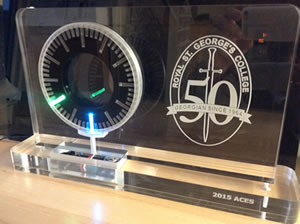 Fast forward from the beginning of the 2003 'experiment' to the present. In these intervening years, society's relentless fascination with, and dependency on, technology continues to sustain our community's awareness that Georgian futures are advantaged by skilled competencies in this field. As a result, the College currently finds itself in the enviable position of offering world-class curricula (ACES) in a world-class secondary school facility (DES). Indeed, we started out in the fall of 2004 simply trying to meet the demands of changing world. Almost two decades later, it's now RSGC ACES that are changing the world.
Fast forward from the beginning of the 2003 'experiment' to the present. In these intervening years, society's relentless fascination with, and dependency on, technology continues to sustain our community's awareness that Georgian futures are advantaged by skilled competencies in this field. As a result, the College currently finds itself in the enviable position of offering world-class curricula (ACES) in a world-class secondary school facility (DES). Indeed, we started out in the fall of 2004 simply trying to meet the demands of changing world. Almost two decades later, it's now RSGC ACES that are changing the world.
The 'secret sauce' of our program is the guiding hand of our ACES' philosophy, embodied in a phrase developed by a former colleague, M. Reid, Tempus est cogitare, is manifested in the primary tenets below.
- The future will continue to belong to the skilled creator/designer/craftsperson/problem-solver with a proven track record of deep thinking, time-management, organization, and, above all, resilience.
- Failure is a necessary stage in the pursuit of success.
- Great design and great engineering are inseparable. We are most fortunate have the continuing support of artist and sculptor, Paul Elia, who contributes countless hours of instruction and support for the development of student design skills.
- In a world replete with all manner of simulation options and virtual platforms, ACES go against the grain by engaging in the physical act of creation. It is only through the manipulation of real materials and components can one fully challenge assumptions, create robust prototypes, and experience the deep personal satisfaction and pride that the act of holding a creation in one's hands.
- Students can best explore their strengths and weaknesses by selecting and committing to their own preferred projects and pursuits. In doing so, they are better prepared to make the best academic (and other life) choices upon graduation from RSGC.
- Outsourcing of services and capabilities that are either impractical or too expensive to undertake in-house can be a desirable and necessary stage (and skill) in the pursuit of significant achievement.
Culture
 The decision to relocate the senior school ACES program to See House, the central building on campus, under the name Design Engineering Studio (DES), in the summer of 2015, was the physical manifestation of the vision of bringing a whole school programming philosophy together, under a common ceiling. Three years later, the decision has proven fruitful in that,
The decision to relocate the senior school ACES program to See House, the central building on campus, under the name Design Engineering Studio (DES), in the summer of 2015, was the physical manifestation of the vision of bringing a whole school programming philosophy together, under a common ceiling. Three years later, the decision has proven fruitful in that,
- Students from Grade 3 through Grade 12 invest countless hours in the DES pursuing their chosen projects. As skills are tested, developed, and mastered, human nature invariably takes takes over and brings out the teacher/mentor in many Georgians, both informally and formally.
- Formal mentorships are evidenced in the numerous after-school clubs that are taught by senior students to their junior school counterparts.
- Project choices by senior students have included the creation of devices that can aid in the development of technical and mathematical concepts being developed in Junior School programs. Two such projects are the BCD Decoder Device and the Fergus Fidget Logic Trainer.
- Those grade 12s that have naturally gravitated to mentorship over the years are invited to take on the formal role of TA (Technical Advisor). Behind prefectship this is one of the most coveted leadership roles within a Georgian's graduation year.
ACES Program
Our ACES' program exploits a simple, but profound, realization,
There is no limit to the amount of effort a Georgian will invest in his own education
when he is convinced of its value and given the creative latitude to pursue it.
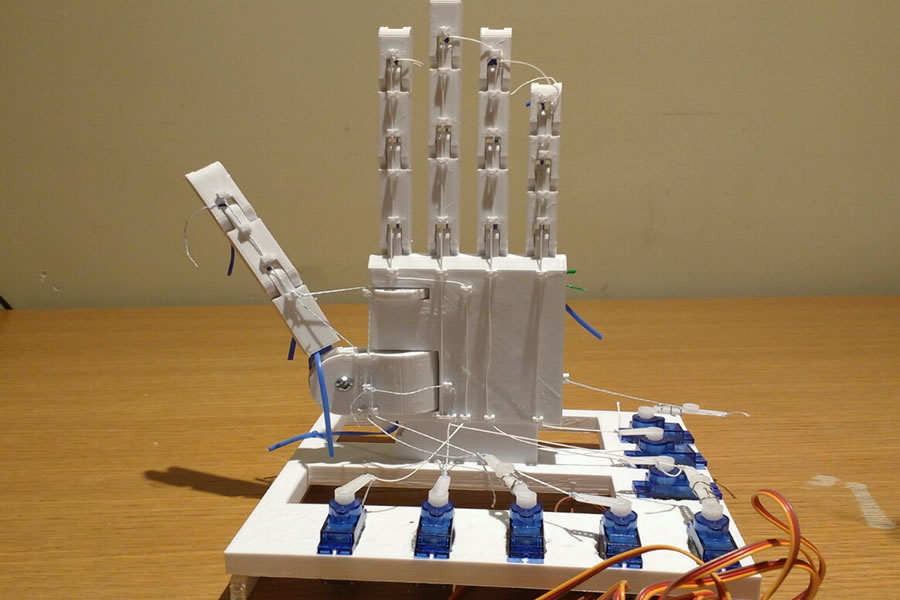 When this awareness hits home, life-altering progress can be made. It is this pervasive consciousness that governs how our buffet of courses and curriculum are organized and presented. There is very little else a parent or teacher can do in this distracted, chaotic world, but set and maintain the academic table.
When this awareness hits home, life-altering progress can be made. It is this pervasive consciousness that governs how our buffet of courses and curriculum are organized and presented. There is very little else a parent or teacher can do in this distracted, chaotic world, but set and maintain the academic table.
- The focus of the formal three-year ACES program leans toward the hands-on investigation of computer, electrical, software, and design (CAD) engineering concepts. Through engagement in their chosen projects, students begin to self-identify the design and engineering direction they're drawn towards. In the 2017-2018 academic year, this trend became so pronounced we modified the credit a student was pursuing in favour of another. It is expected that this trend will continue in that, rather than fit the course to the student, in special cases, we could do the reverse.
- Graduates of our ACES program have built an extensive portfolio of project prototypes, accompanied by comprehensive text and video documentation of them all. Since the majority of Canadian universities offer very little hands-on experience (despite an employment market desperate for skilled engineers) our ACES experience complements Georgians' undergraduate experience and moves them to the head of many queues.
- Whereas the ACES program was originally founded on engineering principles it became apparent in 2014 that until a CAD experience was introduced, students' projects were destined to remain in an incomplete state. Paul Elia continues to pour his time, energy, and resources into the ACES and DES experience, greatly expanding the breadth of possibilities and enriching the lives of the Georgian designers and engineers.
- Programs and curricula are constantly evolving. Turnover in techniques and projects between years in the same course is high. New techniques, tools, input from our grads, and the general level of talent and commitment the students are willing to invest, changes constantly.
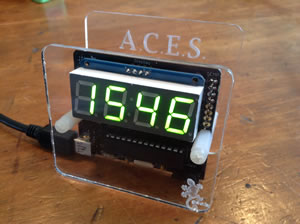 Independent Study Project (ISP). The cornerstone of each of our ACES' courses is the ISP. A student first considers the topics and concepts that have been introduced by imagining a device that combines these principles and topics, prior to submitting a proposal. Blended into his idea is the measure of passion and degree of risk he is willing to engage in the pursuit of a prototypes that he must eventually present to the jury of his peers. It is in this pursuit that the student will invest dozens, if not hundreds, of hours. This is a progressive pursuit in that Grade 10 students undertake but one ISP in their half course, the Grade 11 students pursue two in their year and, by Grade 12, three ISPs are engaged comprising a full 60% of their final mark.
Independent Study Project (ISP). The cornerstone of each of our ACES' courses is the ISP. A student first considers the topics and concepts that have been introduced by imagining a device that combines these principles and topics, prior to submitting a proposal. Blended into his idea is the measure of passion and degree of risk he is willing to engage in the pursuit of a prototypes that he must eventually present to the jury of his peers. It is in this pursuit that the student will invest dozens, if not hundreds, of hours. This is a progressive pursuit in that Grade 10 students undertake but one ISP in their half course, the Grade 11 students pursue two in their year and, by Grade 12, three ISPs are engaged comprising a full 60% of their final mark.- There are no textbooks available to support our curricula that justify the expense. Instead, our introductory Grade 10 course in DC circuits and Grade 11 course on AVR microcontrollers use our own, in-house developed and maintained workbooks.
- Archival of student achievement is a unique hallmark of our program. For each project students are required to develop their technical writing skills through summative reports that have documented the complete project process from start to finish. A short video summary of every project is also required. These reports are accumulated over the years in a single document, known as the Engineering Report that is printed, bound and handed to students on graduation (see photo below) as evidence of their achievements. The DES also retains these documents and has hundreds of graduates' written words and videos in its collection. This archive is of immeasurable inspirational reference value to current students moving through our program.
- An evolutionary feature of our programs is that there are no tests and exams administered within the courses. To get the greatest possible engagement and achievement levels from our students our courses have evolved in respect of the inconsistently busy lives they lead. As is the case with adults, having high expectations for student achievement is only realistic if they are given the tools and flexibility to pursue their responsibilities in manner that allows them to develop strong, independent time-management skills.
- Another feature of our program is that a significant amount of course-related traffic is conducted outside the scheduled class time. Our program's website, email conferences, and weekend submission deadlines all contribute to flexible 24/7 access to the curricula.
- The credit that students earn is largely based on concept subsets of their own choosing. Relieved of the stress of being unprepared for a timed assessment on a subset of material chosen by the instructor, students typically and willingly spend hundreds of hours over the year, developing and refining their prototypes as they are largely in control of the time-management engaged in pursuits they enjoy.
Custom Devices, Tools, and Resources
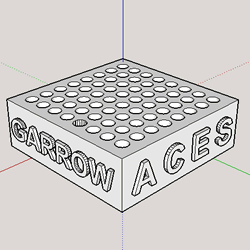 One of the unique features of our ACES program is the extent to which we design and produce our own resources, tools, and learning materials. For instance, for each of the three courses (TEL3M, TEL4M and TEI4M) we have developed our own curriculum workbooks that are revised and edited each summer to ensure they contain the most up-to-date resources, techniques, and tools available. Furthermore, once ACES reach a certain level of facility in Grade 11, they are encouraged to imagine, design, and produce devices that aid in the learning of previous concepts. The image to the right is of a device, designed by a student in Grade 12, that yielded a class set of 3D- printed jigs to assist Grade 11 student is soldering together an LED Matrix. Other devices designed and developed by ACES include,
One of the unique features of our ACES program is the extent to which we design and produce our own resources, tools, and learning materials. For instance, for each of the three courses (TEL3M, TEL4M and TEI4M) we have developed our own curriculum workbooks that are revised and edited each summer to ensure they contain the most up-to-date resources, techniques, and tools available. Furthermore, once ACES reach a certain level of facility in Grade 11, they are encouraged to imagine, design, and produce devices that aid in the learning of previous concepts. The image to the right is of a device, designed by a student in Grade 12, that yielded a class set of 3D- printed jigs to assist Grade 11 student is soldering together an LED Matrix. Other devices designed and developed by ACES include,
- an acrylic bending table
- a CNC machine for milling copper plates into circuits that can be soldered
- an 8-bit computer, designed by an ACE, used as a training kit for Grade 12s
- a digital trainer, dubbed the Fergus Fidget Logic Trainer, for introducing younger students to concepts surrounding logic gates
- dozens of custom circuit boards to aid the development of prototypes and the acquisition of circuit skills
- a reflow oven to aid in the assembly of SMD component-based circuit boards
- a custom personal digital clock, dubbed the Gecko, that is sold in the campus store
- two scrolling message boards
- 2018-2019 will mark the first year in which RSGC ACES, in each of the courses, use custom curricula developed by their teacher.
 DES Facility
DES Facility
- A center table in the middle of the room puts students in ideal proximity to one another and the Smartboard for the discussion, development, and digestion of theories, concepts and ideas.
- Around the perimeter of the room, twenty-two well-appointed engineering workstations allow students to put their designs and prototypes in motion.
- A generous inventory of parts, 3D printers, acrylic-bending table, dremel stations, hot-air surface mount stations and a reflow oven round out the common assets.
- Numerous useful tools and components are custom-designed in house, assembled, and put to good use in the DES. These include the acrylic bending table, a DIY CNC machine, and numerous class sets of instructional circuits for grades 3 through 12.
- Numerous inspirational student projects, starting with the scrolling message board over the door, adorn the walls of the DES.
- A small adjoining soundproof classroom allows for quiet reflective discussion and brainstorming
- Large, south and westward-facing windows, bring enormous amounts of natural sunlight into the space and offer a beautiful view of the the campus.
ACES' Graduates
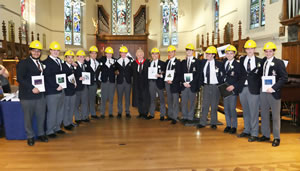 Clicking on the image of last year's ACES graduating class to the right will take readers to our ACES' Hall of Fame. From our first graduating class in 2006, to the fourteen grads shown, one gets a sense of the optimism and promise these young men hold in their heads and hearts.
Clicking on the image of last year's ACES graduating class to the right will take readers to our ACES' Hall of Fame. From our first graduating class in 2006, to the fourteen grads shown, one gets a sense of the optimism and promise these young men hold in their heads and hearts.
ACES' graduates are currently employed in full, summer or intern positions with Microsoft, Google, Cisco, IBM, Shopify, and the majority of Canadian banks who have come to realize that engineers are some of the deepest thinkers and problem-solvers graduating from universities today.
ACES' alumni drop by the DES regularly, either by invitation or chance, to offer their experiences, recommendations and guidance for future directions of both the students and our programs.
Perhaps one of the most interesting legacies our ACES graduates are having, was mentioned off the top of this article, the university view of leaving the hands-on programs and training to Colleges. Earlier this year, two ACES graduates (ACES '15) spearheaded QHacks, a highly successfully hackathon at Queen's University, designed to bring makers, creators, builders, and problem-solvers together for an intense 48-hour weekend competition.
Outsourcing
 While the center of innovation and imagination is located in the DES on the second floor of See House, ACES quickly learn that to achieve successful project ends, they must reach out and capitalize on the services, utilities and production capabilities the entire world has to offer. As soon as they are made aware of the global assets that present themselves on their computer screens one day, and their doorstep occasionally the next day, their time-management and global awareness skills kick into another level. A few of the common resources and locations ACES regularly draw support from include,
While the center of innovation and imagination is located in the DES on the second floor of See House, ACES quickly learn that to achieve successful project ends, they must reach out and capitalize on the services, utilities and production capabilities the entire world has to offer. As soon as they are made aware of the global assets that present themselves on their computer screens one day, and their doorstep occasionally the next day, their time-management and global awareness skills kick into another level. A few of the common resources and locations ACES regularly draw support from include,
- Production of custom-designed printed circuit boards from China's Shenzen, Texas, and Alberta
- Laser cutting facilities from Richmond Hill
- 3D Printing services from Etobicoke
- Components from Minnesota, Ohio, or College Street
- 3D Printers and Nixie Tubes from the Czech Republic
Here are some examples of ACES projects that have established new benchmarks for ACES achievement levels in the past few years...
| K. F-A's POV Globe |
E. M's Photophone |
J. S's Flexible Piano |
M. E's Reflow Oven baking PB Machines |
 |
 |
 |
 |
| E. M's 8-bit Computer |
O. L 's CNC Milling Machine |
J. S's Rubik's Cube Solver |
C. D's Fergus Fidget Logic Trainer |
 |
 |
 |
 |
| J. D's Bi-wheeled Rover |
M. M's Mini CNC Plotter |
D. R. and J.C's 4-bit CHUMP Processor |
C. D. and K. F-A' s Binary Challenge |
 |
 |
 |
 |
| J. Shibley's Rocket Guidance System |
X. Chin's LiDAR Measurement System |
J. Vretenar's Bionic Hand |
S. Atkinson's Dolgin/Atkinson Dev. Brd. |
 |
 |
 |
 |
Created: September 2019. Last Update: January 2022.
Many photos courtesy of T. Stevens.
C. D'Arcy
Prime Minister's Award for Teaching (2016)
Descartes' Medallist, University of Waterloo (2011)
 The year is 2003. RSGC's standard university preparatory curricula is well-established for all students and a wide variety of Advanced Placement courses are offering highly-motivated Georgians the opportunity to process first-year university concepts. Business courses are popular and a large number of commerce-hopeful students are confident, but unaware, of the impending financial collapse about to unfold in their undergraduate years. Mathematics, science, and software courses are healthy and a handful of RSGC graduates are enrolling in engineering programs with aspirations for success, despite having little first-hand experience in the discipline.
The year is 2003. RSGC's standard university preparatory curricula is well-established for all students and a wide variety of Advanced Placement courses are offering highly-motivated Georgians the opportunity to process first-year university concepts. Business courses are popular and a large number of commerce-hopeful students are confident, but unaware, of the impending financial collapse about to unfold in their undergraduate years. Mathematics, science, and software courses are healthy and a handful of RSGC graduates are enrolling in engineering programs with aspirations for success, despite having little first-hand experience in the discipline. 



 One of the unique features of our ACES program is the extent to which we design and produce our own resources, tools, and learning materials. For instance, for each of the three courses (TEL3M, TEL4M and TEI4M) we have developed our own curriculum workbooks that are revised and edited each summer to ensure they contain the most up-to-date resources, techniques, and tools available. Furthermore, once ACES reach a certain level of facility in Grade 11, they are encouraged to imagine, design, and produce devices that aid in the learning of previous concepts. The image to the right is of a device, designed by a student in Grade 12, that yielded a class set of 3D- printed jigs to assist Grade 11 student is soldering together an LED Matrix. Other devices designed and developed by ACES include,
One of the unique features of our ACES program is the extent to which we design and produce our own resources, tools, and learning materials. For instance, for each of the three courses (TEL3M, TEL4M and TEI4M) we have developed our own curriculum workbooks that are revised and edited each summer to ensure they contain the most up-to-date resources, techniques, and tools available. Furthermore, once ACES reach a certain level of facility in Grade 11, they are encouraged to imagine, design, and produce devices that aid in the learning of previous concepts. The image to the right is of a device, designed by a student in Grade 12, that yielded a class set of 3D- printed jigs to assist Grade 11 student is soldering together an LED Matrix. Other devices designed and developed by ACES include,


 DES Facility
DES Facility
















